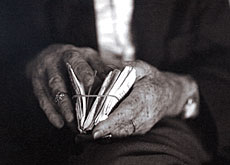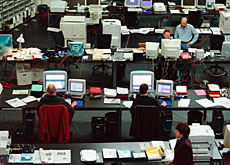
Electronic waste stores up trouble for the future

Millions of tons of obsolete electronic goods or “e-waste” are piling up worldwide leaking hazardous chemicals into the environment.
The question of what to do with them was one subject discussed in Geneva this week at the World Summit on the Information Society.
The fear is that careless disposal of these hazardous materials is endangering human health and the environment.
Computers and other electronic equipment are made from hundreds of different materials. Some are valuable, such as gold and platinum, but many are toxic. Mobile phones, for example contain chemicals such as arsenic, beryllium, cadmium, lead, mercury, nickel and zinc.
“The problem first of all is the quantity of electronic waste,” Thomas Ruddy of the Swiss Federal Laboratories for Materials Testing and Research told swissinfo.
About 82,000 tons of electrical and electronic waste are generated each year in Switzerland alone, according to a study commissioned by the Swiss environment agency.
Around 57,600 tons were recycled in 2001 (about seven kilograms per inhabitant).
Out of service
Switzerland has about five million mobile phone users, and they change their handsets every year or two.
Extrapolating from German figures, it is estimated there are six million disused phones nationwide. That’s about 500 tons of electronic waste.
By 2005, about 100 million of these devices will be “retired” annually in the European Union.
And then there are the computers: in Britain about three million functioning computers are decommissioned each year.
“Many computer users are holding on to their old computers because they don’t know what to do with them,” said Ruddy.
“Companies also have large quantities of computers which are being replaced by newer models. It’s thought there is a considerable backlog that is going to hit the recycling market in the coming years.
“We wonder whether that market place is going to be in a position to handle all these goods in an environmentally compatible way.”
Hazardous waste
Calls have been growing for manufacturers, retailers, consumers and waste disposal operators to take more responsibility.
Switzerland boasts a highly developed “return” system for electronic goods called Swico, which requires manufacturers to take back their products.
Consumers pay a recycling fee in advance when they buy an item. When it reaches the end of its life, they can take it back to any retailer free of charge.
Retailers send the products back to the manufacturers or importers who must dispose of it.
Dumping ground
Few other countries have similar schemes. In the United States, for example, some programmes which offer to recycle obsolete computers simply pass the problem on.
A study released last year by the Basel Action Network and the Silicon Valley Toxics Coalition found that 50-80 per cent of e-waste collected for recycling in the US is actually exported to developing nations such as China, India and Pakistan.
Electronic waste lands in domestic waste or is disposed of without any controls, polluting the environment or exposing local people to toxins.
The Swiss authorities are supporting programmes in India and China promoting the environmentally safe disposal and recycling of electronic waste.
“We have projects allowing people to make a living from recycling electronic waste but making them more aware of the health hazards and improving the conditions,” said Ruddy.
“We are also taking action on the multilateral level to regulate these flows of used information and communication technologies from the industrialised countries into the developing world so that these abuses will not be so extreme.”
Another related issue is to tackle the problem at source: for example, getting manufacturers to design products that use more recycled materials.
swissinfo, Vincent Landon
About 82,000 tons of electrical and electronic waste are generated each year in Switzerland.
Around 57,600 tons were recycled in 2001 (about seven kilograms per inhabitant).
About 50-80 per cent of e-waste collected for recycling in the US is exported to developing countries.

In compliance with the JTI standards
More: SWI swissinfo.ch certified by the Journalism Trust Initiative






































You can find an overview of ongoing debates with our journalists here . Please join us!
If you want to start a conversation about a topic raised in this article or want to report factual errors, email us at english@swissinfo.ch.